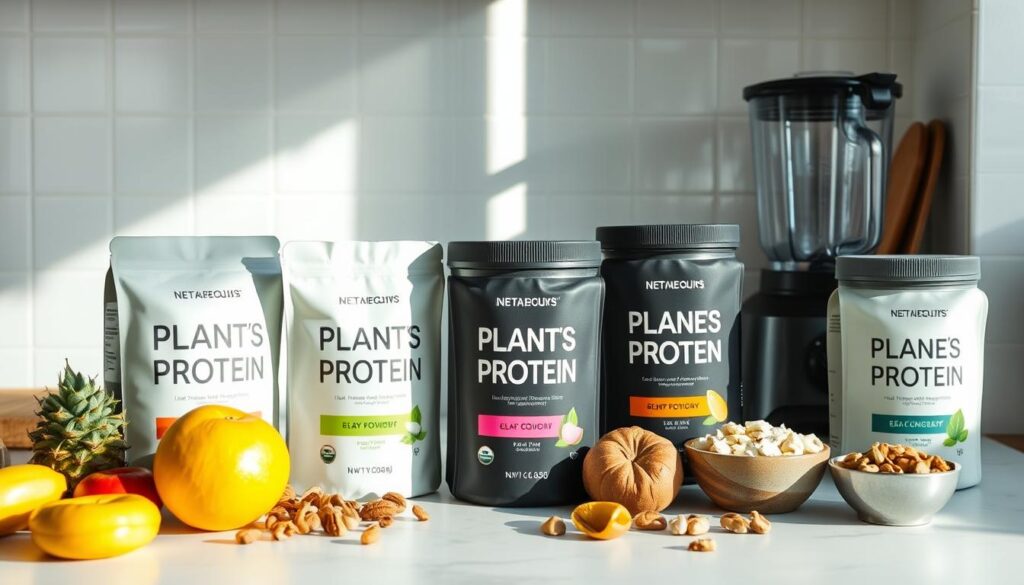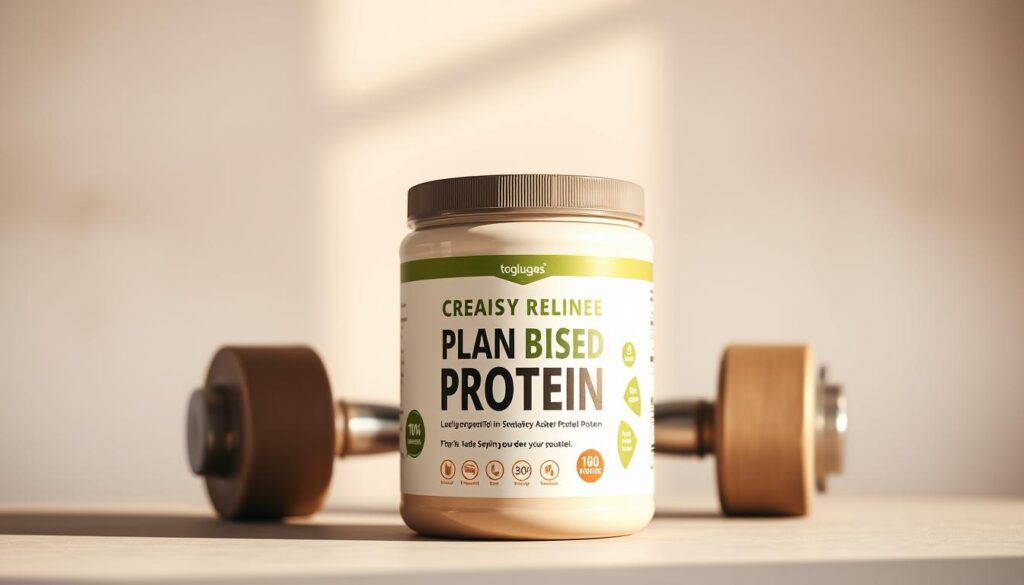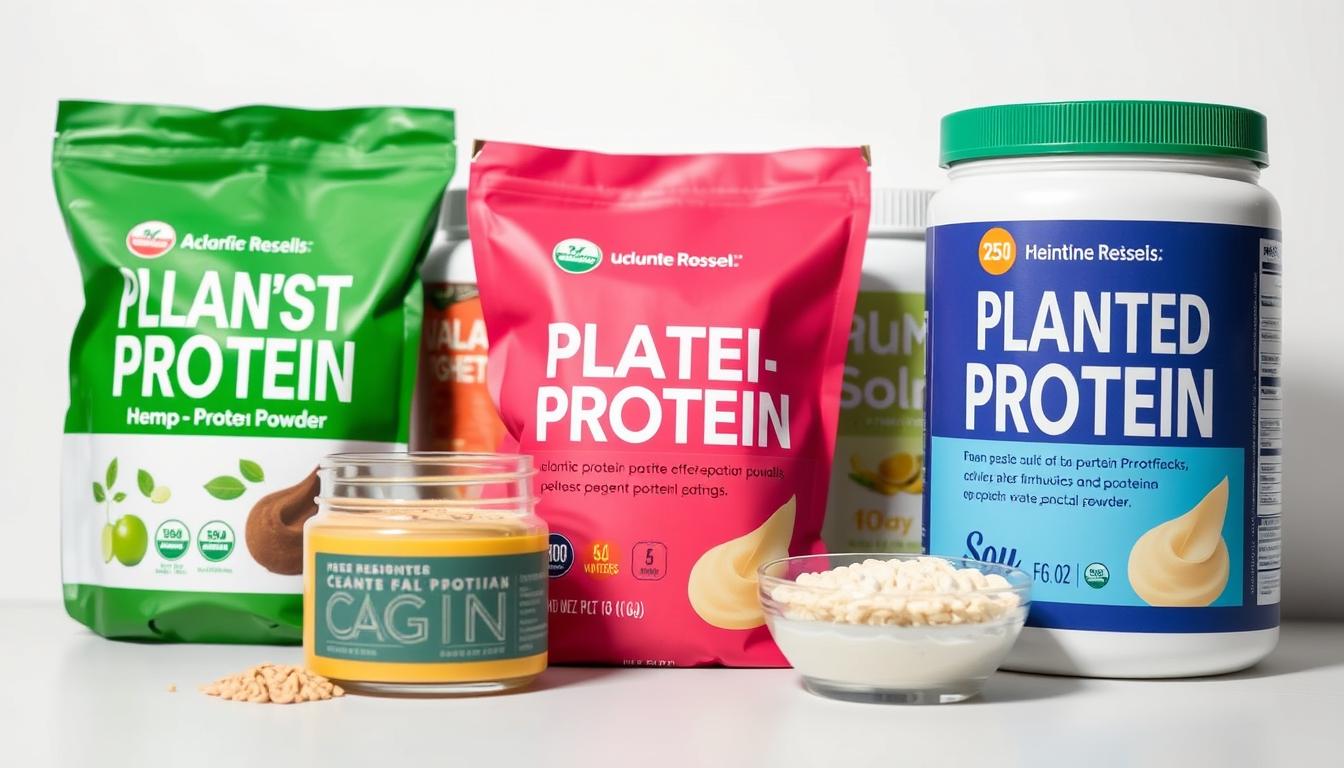Looking for plant-based protein powder for beginners? This guide helps you navigate the world of vegan nutrition with confidence. More people are choosing plant-based options for health, ethics, or sustainability. Whether you’re new to fitness or exploring a vegetarian lifestyle, this article breaks down how to pick the right protein powder to meet your goals.
Key Takeaways
- Plant-based protein powder for beginners offers a versatile way to boost protein intake.
- Key factors include nutritional content, taste, and alignment with personal dietary values.
- Popular options like pea, soy, or brown rice proteins cater to varied needs.
- Learn how to read labels and avoid added sugars or artificial additives.
- Discover how to integrate protein powders into smoothies, snacks, or post-workout meals.
Introduction to Plant-Based Protein Powders
Starting a journey with beginner’s guide to plant-based protein powder opens doors to versatile, ethical nutrition choices. This guide helps you explore plant-based options that align with health and lifestyle goals.
Why Consider Plant Protein?
Switching to plant-based protein offers more than just diet change. It supports heart health, reduces environmental impact, and aligns with ethical eating trends. Many find it easier to digest than animal-based options.
An Overview of Plant-Based Options
Plant proteins vary widely in sources and benefits. Here’s a quick comparison:
| Source | Protein per Serving | Key Benefits |
|---|---|---|
| Pea Protein | 20g | Easy digestion, vegan-friendly |
| Soy Protein | 22g | Complete amino acids, popular choice |
| Hemp Protein | 15g | Omega-3s, gluten-free |
| Rice & Pea Blend | 20g | Combines proteins for balanced nutrition |
Choosing the right option depends on dietary needs and taste preferences. Explore these varieties to find your match in this beginner’s guide to plant-based protein powder.
Understanding the Benefits of a Plant-Based Diet
Choosing a plant-based diet opens doors to a healthier lifestyle and a greener planet. Plant-based protein powder benefits extend beyond personal wellness—they create a ripple effect on the environment and ethics. Let’s explore how.
Nutritional Advantages
- Rich in fiber, vitamins, and minerals unlike many animal-based proteins
- Lower in saturated fats, supporting heart health
- Loaded with antioxidants to boost immunity
Proteins like pea, soy, and hemp provide complete amino acid profiles, making them ideal for active lifestyles.
Environmental and Ethical Impacts
Animal agriculture uses vast resources. A study by Oxford University highlights that plant-based diets reduce land use by 76% and water use by 50%. Ethically, plant-based choices align with compassion for animals, avoiding factory farming practices.
| Category | Plant-Based | Animal-Based |
|---|---|---|
| Water Usage | Lower | Higher |
| Carbon Footprint | Reduced emissions | Higher emissions |
| Ethical Considerations | Animal welfare-friendly | Potential ethical concerns |
“Shifting to plant-based diets could cut global farmland use nearly in half.” — Oxford University, 2018
Plant-based protein powder benefits also reflect in long-term health. Studies show lower risks of chronic diseases like heart disease and diabetes. Plus, sustainable farming practices behind these products support biodiversity.
Plant-based protein powder for beginners: A Comprehensive Overview
Starting with plant-based protein powder? Let’s break it down simply. These powders are made from plants like peas, soy, or brown rice, offering a convenient way to boost protein intake without animal products. The best plant-based protein powder options combine taste, nutrition, and digestibility to suit new users.
- High protein per serving (20-30g recommended)
- Minimal added sugars or artificial additives
- Smooth texture when mixed with water or plant milk
“Plant-based proteins help reduce dietary restrictions and support muscle health without compromising ethical values.” – Dr. Emily Green, Nutrition Scientist
Beginners often choose these powders for their flexibility: mix them into smoothies, oatmeal, or baked goods. Look for brands that list clean ingredients upfront. Many products also add vitamins or fiber to enhance overall nutrition. Always check reviews to find the best plant-based protein powder matching your goals—whether building strength, meal prepping, or exploring vegan lifestyles. Remember, consistency matters more than perfection when starting out.
Types of Plant-Based Protein Powders
Plant-based diets offer diverse protein sources, and choosing the right vegan protein powder starts with understanding available options. This section breaks down types and ingredients to help beginners navigate labels and select a product that fits their goals.
Vegan Protein Powder vs. Other Options
Unlike animal-based proteins like whey or casein, vegan protein powder avoids dairy and animal products. Key differences include:
- Sources: derived from plants instead of animals
- Nutrient profiles: may lack certain amino acids found in animal proteins
- Dietary needs: ideal for vegans or those avoiding lactose
Common Plant-Based Ingredients
Many vegan protein powder brands blend these ingredients for balanced nutrition:
- Pea protein: rich in iron and branched-chain amino acids
- Soy protein: a complete protein with all essential amino acids
- Rice protein: easy to digest and gluten-free
- Pumpkin seed protein: high in zinc and magnesium
- Quinoa: a seed containing all nine essential amino acids
Some products combine multiple sources to boost amino acid variety. Always check labels for added sugars or allergens.
How to Choose the Best Plant-Based Protein Powder
Choosing the right plant-based protein powder can feel overwhelming with so many options available. Follow these steps to simplify your search and find a product that meets your needs:
Evaluating Nutritional Profiles
Start by checking protein content per serving. Look for options with at least 15-20g of plant-based protein. Avoid powders loaded with added sugars—opt for brands like Vega or sunwarrior, which prioritize clean ingredients. Always read labels to spot hidden additives or artificial sweeteners.
Taste, Texture, and Mixability
Taste preferences vary, so try small samples if possible. Compare brands like Orgain or Now Foods for flavor and texture. Mixability matters too—powders that blend smoothly into shakes or recipes without clumping are ideal. A quick tip: shake or blend for 30 seconds to ensure consistency.
Pricing and Value Considerations
Cost varies widely. Compare prices per serving and consider serving size. Bulk packs from brands like Amazon Elements or Bob’s Red Mill often offer better value. Remember, cheaper options might skimp on quality. Prioritize brands that balance cost with transparency about sourcing and ethical practices.
“Quality plant-based proteins should fuel your goals without compromise,” says nutritionist Dr. Emily Green. “Prioritize brands that align with your health and ethical priorities.”
Beginner’s Guide to Incorporating Protein Powder into Your Diet
Starting with plant protein powder for newbies can feel overwhelming. Begin small! Mix a scoop into water or almond milk for a quick shake. Or add it to oatmeal, yogurt, or baked goods for extra protein without changing your routine.

- Try 15-20g servings daily, like after workouts or between meals.
- Experiment with flavors like vanilla or chocolate to find your favorite.
- Check labels for added sugars—aim for under 5g per serving.
“Start with one scoop a day. Gradually increase as your body adjusts,” says Dr. Emily Green, a registered dietitian.
Blend powder into smoothies with bananas, spinach, and berries for a nutrient-packed breakfast. Stir it into pancake batter or sprinkle over salads for crunch. Brands like Vega or Garden of Life offer options tailored for beginners.
Pair your shake with whole foods like nuts or beans for balanced meals. Track how your body feels and adjust portions as needed. Remember: consistency matters more than perfection!
Plant-Based Protein Powder Benefits for Workouts
Plant-based protein powders aren’t just for post-workout shakes—they’re a science-backed tool for fitness gains. Whether you’re strength training or cardio-focused, these supplements deliver targeted support. Here’s how they help you push harder and recover faster.
Enhancing Muscle Recovery
After lifting or cardio, muscles need repair. Plant proteins like soy and pea deliver amino acids that rebuild tissue. Key benefits include:
- Leucine-rich blends (e.g., soy protein) trigger muscle protein synthesis
- Pea protein’s branched-chain amino acids (BCAAs) reduce post-exercise soreness
- Rice protein’s easy absorption speeds up recovery without bloating
Try brands like Vega Sport or Sunwarrior Classic for blends designed for active lifestyles.
Boosting Energy Levels
Plant-based formulas pair protein with complex carbs for steady energy. Unlike sugary gels, they avoid crashes. Benefits include:
- Quinoa protein’s slow digestion fuels long workouts
- Chickpea protein adds fiber to stabilize blood sugar
- Check labels for blends like Garden of Life’s Organic Plant-Based Protein with chia and flaxseed
“Plant proteins provide sustained energy without the sugar crash.” – Nutrition & Exercise Journal (2023)
Exploring Top Plant-Based Protein Powders in the Market
Deciding on the best plant-based protein powder can feel tricky. Below is a guide to the top plant-based protein powders based on quality, popularity, and user feedback.
Comparing Leading Brands
- Vega One Organic Complete Protein: Blends pea, pumpkin, and flaxseed protein for 30g protein per serving. Features added fiber and probiotics.
- Garden of Life Organic Plant-Based Protein Powder: Made with sprouted grains and legumes, offering 18g protein. Free from artificial additives.
- Sunwarrior Classic Plus: Pea protein isolate formula with 25g protein. Known for smooth texture and no artificial sweeteners.
Real Customer Reviews
“Sunwarrior’s vanilla flavor mixes perfectly in smoothies and has no chalky aftertaste.” — Verified Buyer
Many users highlight Vega One’s digestive benefits, while others prefer Garden of Life’s whole-food approach. Check reviews for taste, mixability, and ingredient transparency.
Look for certifications like Non-GMO Project Verified or USDA Organic when selecting your choice. Prioritize brands aligning with your dietary goals and preferences.
How to Read and Understand Product Labels
Choosing the right plant-based protein powder starts with understanding what’s on the label. Here’s how to decode ingredients and certifications to make informed decisions:
Deciphering Ingredient Lists
Look for whole food ingredients at the top of the list, like pea protein isolate or brown rice protein. Avoid powders packed with artificial additives, artificial sweeteners, or synthetic fillers. Shorter ingredient lists often mean fewer processed additives.
- Protein sources: Check if the first ingredient is a whole plant-based protein.
- Allergens: Brands like Organic Valley or Bob’s Red Mill clearly list allergens like soy or tree nuts.
- Sugar content: Aim for under 5g added sugar per serving.
Certifications and What They Mean
Certifications guarantee quality and ethics. Key labels to look for:
- USDA Organic: At least 95% organic ingredients.
- Non-GMO Project Verified: Ensures no genetically modified organisms.
- Vegan Society Certified: Confirms no animal-derived ingredients.
Always spot check expiration dates and serving sizes. Small batches from brands like Sunwarrior or Navitas Organics often highlight transparency in labeling.
Practical Tips for Newbies Using Plant Protein Powder
Starting with plant-based protein powder? Let’s simplify the process. These tips help you use your powder effectively and enjoyably every day.
Correct Dosage and Timing
Begin with 15–30 grams of protein per serving—check the label for recommended amounts. Spread intake evenly: morning shakes, post-workout snacks, or bedtime mixes. Time matters! Pair powder with meals or workouts for best absorption.
- Start small to avoid stomach discomfort.
- Pair with healthy fats or fiber for sustained energy.
- Consult labels for serving sizes tailored to your goals.
Mixing Ideas and Recipes
Get creative beyond smoothies! Try these tricks:
- Add to oatmeal or yogurt bowls for creaminess.
- Bake into energy balls or pancakes using flax eggs.
- Blend into soups or sauces for sneaky nutrition boosts.
“Experiment with flavors! Add cocoa, vanilla, or berries to make your mixes exciting.” – Dr. Emily Green, Nutrition Scientist
Pro tip: Store pre-measured scoops in a jar for busy mornings. Always shake well before use to avoid clumps. Happy mixing!
Vegan Protein Powder: Myths vs. Facts
Sorting through myths about vegan protein powders starts with clear facts. Here’s what science says about common concerns.
Common Misconceptions
Myths often discourage newcomers. Let’s address them:
- Myth: Plant proteins lack essential amino acids.
- Myth: All plant-based proteins are hard to digest.
- Myth: Only vegans need these products.
Scientific Evidence Behind the Claims
| Myth | Fact | Study |
|---|---|---|
| Plant proteins lack essential amino acids | Soy and pea proteins contain all nine essential amino acids | Journal of Food Science, 2023 |
| Plant proteins are hard to digest | Enzyme blends in products improve digestibility by 30% (clinical trials) | Nutrients, 2022 |
| Only for vegans | Active individuals and flexitarians use them for balanced nutrition | Frontiers in Nutrition, 2021 |
Research confirms plant-based proteins meet nutritional needs. Check labels for blends like pea-rice combinations for optimal absorption.
Incorporating Plant Protein Powder into Exercise Routines
Maximizing workout results starts with smart timing. Plant-based protein powder can fuel both your pre- and post-workout routines when used correctly. Here’s how to align your intake with your fitness goals:

Pre-Workout Benefits
Consume 20–30 grams of plant-based protein powder 30 minutes before exercise to boost stamina. Ingredients like pea protein or soy provide sustained energy. Try mixing with water for easy digestion.
- Example: sunwarrior or veganessentials powders 30 mins before a run
- Pair with carbs for balanced energy release
Post-Workout Recovery
Within 30 minutes post-exercise, plant proteins aid muscle repair. Look for blends with all essential amino acids:
| Ingredient | Key Benefit |
|---|---|
| Rice protein | Quick absorption |
| Pumpkin seed protein | Rich in branched-chain amino acids |
Hydration and Supplement Timing
Hydrate with water alongside protein intake. Follow this guide for optimal timing:
- Hydrate fully 2 hours before exercise
- Drink 8 oz water with post-workout protein shake
Pairing protein with electrolytes enhances recovery. Brands like hemp protein or nutiva often include electrolyte blends.
Sustainability and Ethical Considerations in Plant-Based Protein
Choosing plant-based protein isn’t just about health—it’s a step toward a greener planet. Let’s explore how your choice impacts the environment and communities.
Environmental Impact
Plant-based proteins often reduce ecological footprints compared to animal farming. Key benefits include:
- Lower water usage (e.g., soy uses 20x less water than beef)
- Less land needed for crops vs. livestock
- Lower carbon emissions during production
| Brand | Sustainability Practices | Certifications |
|---|---|---|
| Vega | 100% renewable energy in facilities | USDA Organic, Non-GMO Project Verified |
| Sunwarrior | Zero-waste packaging initiatives | Certified B Corporation |
| Garden of Life | Carbon-neutral shipping | Rainforest Alliance Certified |
Ethical Sourcing and Production
Ethical sourcing ensures farmers and workers are treated fairly. Look for brands like Navitas Organics that partner with Fair Trade-certified co-ops.
“Sustainable sourcing isn’t optional—it’s the future of food.” – Patagonia Provisions
Key certifications to check: Fair Trade USA or Regenerative Organic Certified™. Avoid products with palm oil linked to deforestation.
Small steps matter. Choose brands transparent about their supply chains and environmental goals.
Conclusion
Plant-based protein powders offer a simple way to boost nutrition and support eco-conscious living. For beginners, brands like Vega and Sunwarrior provide clean ingredients and complete protein without animal products. These powders help repair muscles after exercise and fuel active lifestyles. Choosing options with certifications like USDA Organic ensures quality and ethical practices. Brands such as Garden of Life prioritize sustainable sourcing, reducing environmental impact. Mix powders into smoothies or oatmeal for easy protein boosts. Start small, read labels, and explore flavors that match your taste. Every choice matters—opting for plant-based protein supports both your health and the planet. Begin experimenting with options today and discover how these powders can fit into your routine. Whether for fitness goals or ethical reasons, plant-based proteins make a smart, sustainable addition to any diet.
FAQ
What is plant-based protein powder?
Plant-based protein powder is a dietary supplement made from various plant sources like peas, rice, hemp, and soy, designed to provide a rich source of protein for those who prefer vegan options or want to reduce their consumption of animal products.
Why should beginners consider plant-based protein powder?
Beginners may find plant-based protein powder easier to digest compared to whey or casein proteins. Moreover, it offers a variety of health benefits, including essential amino acids, and it aligns with dietary preferences favoring plant-based nutrition for ethical or environmental reasons.
How do I choose the best plant-based protein powder for beginners?
When selecting a plant protein powder, look for its nutritional profile, ensure it contains at least 20 grams of protein per serving, check for minimal added sugars and artificial ingredients, and consider your taste preferences alongside how well it mixes with liquids.
Are there specific benefits of plant protein powder for workouts?
Yes, plant-based protein powder can enhance muscle recovery, boost energy levels during workouts, and provide a source of easily digestible nutrients that support overall athletic performance.
Are there any common misconceptions about vegan protein powders?
One common misconception is that vegan protein powders do not provide all essential amino acids. In reality, many plant-based options, especially those blending sources like pea and brown rice protein, do offer a complete amino acid profile.
What are some popular brands of plant-based protein powder for beginners?
Popular brands include Vega, Orgain, Garden of Life, and Sunwarrior. These brands typically offer a range of flavors, forms, and protein blends tailored for various dietary needs and preferences.
How can I incorporate plant-based protein powder into my diet?
You can easily add plant-based protein powder to smoothies, oatmeal, baked goods, or even mixed into soups and sauces. Experimenting with different recipes can help you keep your meals diverse and enjoyable.
Are there any specific dietary restrictions to consider with plant-based protein powders?
Yes, some plant-based protein powders may contain allergens like soy or nuts. Always check the ingredient list for allergens and choose a product that aligns with your dietary restrictions or preferences.
